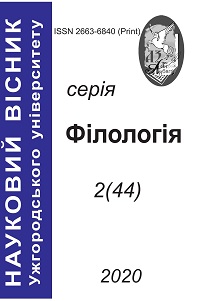ENGLISH ANIMALISTIC SET PHRASES OF VERBAL SEMANTICS AND THEIR UKRAINIAN EQUIVALENTS
DOI:
https://doi.org/10.24144/2663-6840.2020.2.(44).269-275Ключові слова:
phrase, phraseology, phrase formation, phraseological identification, animalistic component.Анотація
The article deals with the ways of rendering English animalistic components in verbal set phrases by their Ukrainian equivalents. It gives a contemporary definition of a phraseological unit. The approaches to scholastic analysis, pro- posed in the article are based on understanding phraseology as a semantic phenomenon, in which the comparison of its units in different languages is realized in establishing correlation of both their generalized figurative meaning and the inner form that motivates them, actively supporting a high connotative potential. The article also gives the definition of phrase formation as a doctrine, dealing with regular processes of arising and meaning development of phraseological units, applying diachronic and synchronic approaches to the investigation. The principles of A.V. Koonin’s phraseological conception and his method of phraseological identification have been underlain in the study. In addition to this, the descriptive method and the analysis of dictionary definitions from several explanatory and phraseological dictionaries in both languages compared have been used for achieving higher objectivity in representing the results of the research. The whole corpus of the empirical material analysis demonstrated the existence of the following 5 phraseological animalistic subgroups: 1) animalistic phrases designating an extensive field of usual human actions and behaviour; 2) information about the state and feeling of a person; 3) the description of mutual relations among people; 4) time-indicating animalistic verbal phrases; 5) animalistic verbal phrases of quantitative action representation. Each of these groups has been analyzed in detail and exemplified with a number of phrases from both languages compared. The author draws a general conclusion that an animalistic component in English verbal phrase formation is more frequently used than in Ukrainian. As far as semantic peculiarities are concerned, it has been noted that the features of character that are ascribed to a certain group of people by animalistic components in both languages for the most part do not coincide.

